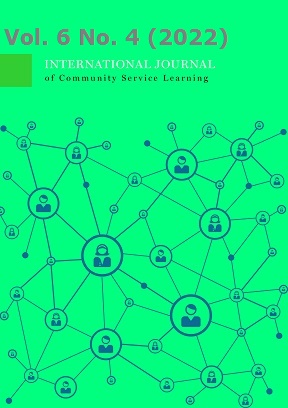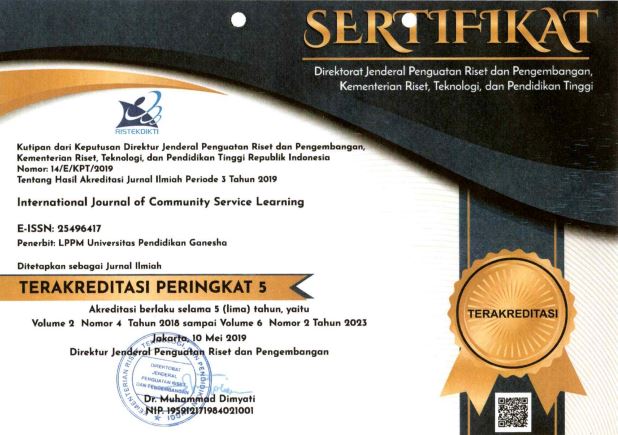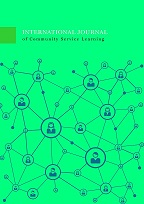English Training for PKK Mothers as Strategy to Assist Children Learn English from Young Age
DOI:
https://doi.org/10.23887/ijcsl.v6i4.50358Keywords:
Training, English, Young Learners, AssistanceAbstract
Currently, many children are exposed to English, especially from online media, and are starting to practice it at home. Children, especially toddlers, need assistance at home from their mothers. However, not all parents especially mothers have enough English skills to teach their own children. Therefore, the community service that is carried out for PKK women in Karangploso View is expected to improve English communication by parents at home better. The community service aims to increase the English skill of the member of PKK mothers. The method used in this activity is the Participatory Action Study (PAR). From community service, you are more confident in speaking English with your child at home, you have your own way of communicating in English according to the character of your child, and your child has an increase in his daily vocabulary in English at home. It is implicated that parents especially mothers can teach English at home by themselves and get used children to start using English from a young age.
References
Agusniatih, A., & Manopa, J. M. (2019). Keterampilan Sosial Anak Usia Dini: Teori dan Metode Pengembangan. In Edu Publisher.
Bradbury, D., Chisholm, A., Watson, P. M., Bundy, C., Bradbury, N., & Birtwistle, S. (2018). Barriers and facilitators to health care professionals discussing child weight with parents: A meta‐synthesis of qualitative studies. British Journal of Health Psychology, 23(3), 701–722. https://doi.org/10.1111/bjhp.12312. DOI: https://doi.org/10.1111/bjhp.12312
Budianingsih, T. (2017). Peran neurolinguistik dalam pengajaran bahasa. Jurnal Al-Azhar Indonesia Seri Humaniora, 3(2), 137–149. https://doi.org/10.36722/sh.v3i2.203. DOI: https://doi.org/10.36722/sh.v3i2.203
Cavus, N., Shukshina, L., Chernova, O., Telezhko, I., Ishmuradova, A., & Zakharova, V. (2020). Perceptions of foreign language teachers for M-learning. International Journal of Emerging Technologies in Learning (IJET), 15(23), 95–107. https://www.learntechlib.org/p/218467/. DOI: https://doi.org/10.3991/ijet.v15i23.18799
Dewi, P. (2019). Teaching English for young learners through ICTs. Humanitatis: Journal of Language and Literature, 6(1), 11–24. https://doi.org/10.30812/humanitatis.v6i1.612.
Fitriani, R., & Adawiyah, R. (2018). Perkembangan fisik motorik anak usia dini. Jurnal Golden Age, 2(1), 25–34. https://doi.org/10.29408/goldenage.v2i01.742. DOI: https://doi.org/10.29408/goldenage.v2i01.742
Getie, A. S. (2020). Factors affecting the attitudes of students towards learning English as a foreign language. Cogent Education, 7(1), 1738184. https://doi.org/10.1080/2331186X.2020.1738184. DOI: https://doi.org/10.1080/2331186X.2020.1738184
Goodall, J., & Montgomery, C. (2014). Parental involvement to parental engagement: A continuum. Educational Review, 66(4), 399–410. https://doi.org/10.1080/00131911.2013.781576. DOI: https://doi.org/10.1080/00131911.2013.781576
Haliza, N., Kuntarto, E., & Kusmana, A. (2020). Pemerolehan bahasa anak berkebutuhan khusus (tunarungu) dalam memahami bahasa. Metabasa: Jurnal Bahasa, Sastra, Dan Pembelajaran, 2(1). https://jurnal.unsil.ac.id/index.php/mbsi/article/view/1805/1183. DOI: https://doi.org/10.26555/jg.v2i1.2051
Hamer, W., & Rohimajaya, N. A. (2018). Using Flash Card as Instructional Media to Enrich the Students’ Vocabulary Mastery in Learning English. Journal of English Language Studies, 3(2), 167–177. https://doi.org/10.30870/jels.v3i2.3875. DOI: https://doi.org/10.30870/jels.v3i2.3875
Handayani, S. (2016). Pentingnya kemampuan berbahasa Inggris sebagai dalam menyongsong ASEAN Community 2015. Jurnal Profesi Pendidik, 3(1), 102–106. http://ispijateng.org/wp-content/uploads/2016/05/Pentingnya-Kemampuan-Berbahasa-Inggris-Sebagai-Dalam-Menyongsong-Asean-Community-2015_Sri-Handayani.pdf
Hasbi, M., Munawir, A., Ahmad, G., & Khair, U. (2022). Teaching Vocabulary Using Games: Empowering Students’ Interest in ELT Classrooms. PATIKALA: Jurnal Pengabdian Kepada Masyarakat, 1(3), 155–160. https://doi.org/10.51574/patikala.v1i3.290.
Hidayati, R. (2020). Peran Orang Tua: Komunikasi Tatap Muka Dalam Mengawal Dampak Gadget Pada Masa Golden Age. Source: Jurnal Ilmu Komunikasi, 5(2). https://doi.org/10.35308/source.v5i2.1396. DOI: https://doi.org/10.35308/source.v5i2.1396
Horwath, J., Kalyva, E., & Spyru, S. (2012). “I want my experiences to make a difference” promoting participation in policy-making and service development by young people who have experienced violence. Children and Youth Services Review, 34(1), 155–162. https://doi.org/10.1016/j.childyouth.2011.09.012. DOI: https://doi.org/10.1016/j.childyouth.2011.09.012
Iftitah, S. L., & Anawaty, M. F. (2020). Peran orang tua dalam mendampingi anak di rumah selama pandemi Covid-19. JCE (Journal of Childhood Education), 4(2), 71–81. https://doi.org/10.30736/jce.v4i2.256. DOI: https://doi.org/10.30736/jce.v4i2.256
Jatiningsih, O., Habibah, S. M., Wijaya, R., & Sari, M. M. K. (2021). Peran orang tua dalam pemenuhan hak pendidikan anak pada masa belajar dari rumah. Jurnal Ilmu Sosial Dan Humaniora, 10(1), 147–157. https://doi.org/10.23887/jish-undiksha.v10i1.29943. DOI: https://doi.org/10.23887/jish-undiksha.v10i1.29943
Khan, R. M. I. (2022). The use of Flashcards in teaching EFL vocabulary in online learning. Register Journal, 15(1), 109–125. https://doi.org/10.18326/rgt.v15i1.109-125. DOI: https://doi.org/10.18326/rgt.v15i1.109-125
Kusumawardhani, P. (2020). The use of flashcards for teaching writing to English young learners (EYL). Scope: Journal of English Language Teaching, 4(1), 35–52. https://doi.org/10.30998/scope.v4i01.4519. DOI: https://doi.org/10.30998/scope.v4i01.4519
Li, J. T., & Tong, F. (2019). Multimedia-assisted self-learning materials: the benefits of E-flashcards for vocabulary learning in Chinese as a foreign language. Reading and Writing, 32(5), 1175–1195. https://doi.org/10.1007/s11145-018-9906-x. DOI: https://doi.org/10.1007/s11145-018-9906-x
Makrifah, I. A., Rofi’ah, S., & Widiarini, W. (2020). Pelatihan Berbahasa Inggris bagi Ibu-Ibu PKK Desa Gaprang Kecamatan Kanigoro Blitar sebagai Strategi Pendampingan Anak Berbahasa Inggris Sejak Dini. Jurnal Pengabdian Dan Pemberdayaan Nusantara (JPPNu), 2(2), 130–134. http://journal.unublitar.ac.id/jppnu/index.php/jppnu/article/view/24.
Purnajati, I. G., Sulastri, M., & Kusmaryatni, N. (2013). Implementasi Metode Mengajar dengan Teknik Bermain Peran untuk Meningkatkan Kemampuan Berbahasa Siswa Kelompok B TK Widya Kumara Sari Kubutambahan. Jurnal Pendidikan Anak Usia Dini Undiksha, 1(1). https://doi.org/10.23887/paud.v1i1.1471.
Rahman, M. M. (2015). Pendidikan Keluarga Berbasis Gender. Jurnal Musawa IAIN Palu, 7(2), 234–255. https://media.neliti.com/media/publications/114179-ID-pendidikan-keluarga-berbasis-gender.pdf
Rambe, S. (2019). Total Physical Response. English Education: English Journal for Teaching and Learning, 7(1), 45–58. https://doi.org/10.24952/ee.v7i01.1652. DOI: https://doi.org/10.24952/ee.v7i01.1652
Rao, P. S. (2019). The role of English as a global language. Research Journal of English, 4(1), 65–79. https://www.rjoe.org.in/Files/vol4issue1/new/OK RJOE-Srinu sir(65-79).pdf
Razaq, Y. (2022). The Use of Flashcards to Improve Students’ Vocabulary Achievement. ETDC: Indonesian Journal of Research and Educational Review, 1(2), 145–151. https://doi.org/10.51574/ijrer.v1i2.332.
Risager, K. (2021). Language textbooks: windows to the world. Language, Culture and Curriculum, 34(2), 119–132. https://doi.org/10.1080/07908318.2020.1797767. DOI: https://doi.org/10.1080/07908318.2020.1797767
Rusdiana, L., Himmah, E. F., Elmayantie, C., & Hardita, V. C. (2022). Implementasi Aplikasi Kamus Bergambar Bahasa Dayak Ngaju-Bahasa Inggris Bagi Anak. JPMB: Jurnal Pemberdayaan Masyarakat Berkarakter, 5(1), 21–32. http://journal.rekarta.co.id/index.php/jpmb/article/view/462/406.
Safitri, R. W., Primiani, C. N., & Hartini, H. (2018). Pengembangan media flashcard tematik berbasis permainan tradisional untuk kelas IV sub tema lingkungan tempat tinggalku. Premiere Educandum: Jurnal Pendidikan Dasar Dan Pembelajaran, 8(1), 1–14. https://doi.org/10.25273/pe.v8i1.1332. DOI: https://doi.org/10.25273/pe.v8i1.1332
Susilowati, R. D., Sutama, S., & Faiziyah, N. (2020). Penerapan Podcast pada Aplikasi Spotify Sebagai Media Pembelajaran Matematika di Tengah Pandemi Covid-19. Jurnal Riset Pendidikan Dan Inovasi Pembelajaran Matematika (JRPIPM), 4(1), 68–78. https://doi.org/10.26740/jrpipm.v4n1.p68-78. DOI: https://doi.org/10.26740/jrpipm.v4n1.p68-78
Wahyuningtyas, R., Rochanah, R., & Izatovna, T. S. (2022). Impacts of Gadget on Early Childhood Development: How to Solve the Addiction Gadget? Bulletin of Early Childhood, 1(1), 58–67. https://doi.org/10.51278/bec.v1i1.411. DOI: https://doi.org/10.51278/bec.v1i1.411
Downloads
Published
How to Cite
Issue
Section
License
Copyright (c) 2022 International Journal of Community Service Learning

This work is licensed under a Creative Commons Attribution-ShareAlike 4.0 International License.

International Journal of Comunnity Service Learning is licensed under a Creative Commons Attribution-ShareAlike 4.0 International License.













